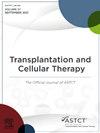Recent Advances in the Prognosis of HHV-6 Encephalitis Following Allogeneic Hematopoietic Stem Cell Transplantation
IF 3.6
3区 医学
Q2 HEMATOLOGY
引用次数: 0
Abstract
Human herpesvirus-6 (HHV-6) encephalitis is a rare but fatal complication following allogeneic hematopoietic stem cell transplantation (allo-HSCT). Despite advancements in transplantation outcomes and supportive care, knowledge regarding the clinical features and prognostic factors of HHV-6 encephalitis remains limited. This study aims to clarify the clinical characteristics of HHV-6 encephalitis in allo-HSCT recipients and to identify prognostic factors. This is a single-center retrospective study that analyzed the patients with HHV-6 encephalitis who underwent allo-HSCT at our institute between 2004 and 2023. The diagnosis of HHV-6 encephalitis was confirmed by the presence of neurological symptoms and the detection of HHV-6 DNA in the cerebrospinal fluid using real-time polymerase chain reaction. Fifty-three patients were included in this study. The median time from allo-HSCT to HHV-6 encephalitis onset was 24 days (range: 3 to 189). Of the 53 patients, 38 (71.7%) received systemic steroids, with a median interval of 11 days (range: 2 to 46) from steroid initiation to encephalitis onset. One-year overall survival and non-relapse mortality (NRM) after encephalitis diagnosis were 33.5% and 46.5%, respectively. While HHV-6 encephalitis directly caused one death, infections unrelated to HHV-6 were the leading cause of mortality (47.5%). The interval from the onset to the initiation of antiviral therapy was significantly shorter in recent cases (0.0 after 2018 versus 1.5 days before 2017: P = .0086), and 1-year NRM was significantly lower (26.8 versus 62.1%; P = .024). Multivariate analysis revealed that allo-HSCT before 2017 (hazard ratio [HR] 3.13, P = .012) and haploidentical transplantation (HR 3.07, P = .001) were independent prognostic factors for NRM. Among the 32 patients who survived for over 100 days after the initiation of HHV-6 encephalitis treatment, neurological sequelae persisted in 16 (50.0%) cases, including short-term memory impairment in 11. Overall, our study indicates that recent improvements in HHV-6 encephalitis outcomes after allo-HSCT likely result from earlier initiation of antiviral treatment.
异体造血干细胞移植后HHV-6脑炎预后的最新进展。
背景:人疱疹病毒6 (HHV-6)脑炎是异基因造血干细胞移植(alloo - hsct)后罕见但致命的并发症。尽管移植结果和支持治疗取得了进展,但关于HHV-6脑炎的临床特征和预后因素的知识仍然有限。目的:本研究旨在阐明同种异体造血干细胞移植受者HHV-6脑炎的临床特征,并确定预后因素。研究设计:这是一项单中心回顾性研究,分析了2004年至2023年在我所接受同种异体造血干细胞移植的HHV-6脑炎患者。通过出现神经系统症状和实时聚合酶链反应检测脑脊液中HHV-6 DNA,证实了HHV-6脑炎的诊断。结果:53例患者纳入本研究。从同种异体造血干细胞移植到HHV-6脑炎发病的中位时间为24天(范围:3-189天)。在53例患者中,38例(71.7%)接受了全身性类固醇治疗,从类固醇开始到脑炎发作的中位间隔为11天(范围:2-46天)。脑炎诊断后的一年总生存率和非复发死亡率(NRM)分别为33.5%和46.5%。虽然HHV-6脑炎直接导致1例死亡,但与HHV-6无关的感染是死亡的主要原因(47.5%)。近期病例从发病到开始抗病毒治疗的间隔时间显著缩短(2018年后0.0天vs. 2017年前1.5天:p = 0.0086),1年NRM显著降低(26.8 vs. 62.1%; = 0.024页)。多因素分析显示,2017年之前的同种异体移植(风险比[HR] 3.13, p = 0.012)和单倍体移植(风险比[HR] 3.07, p = 0.001)是NRM的独立预后因素。在开始HHV-6脑炎治疗后存活超过100天的32例患者中,16例(50.0%)的神经系统后遗症持续存在,包括11例的短期记忆障碍。结论:总的来说,我们的研究表明,最近同种异体造血干细胞移植后HHV-6脑炎预后的改善可能是早期开始抗病毒治疗的结果。
本文章由计算机程序翻译,如有差异,请以英文原文为准。
求助全文
约1分钟内获得全文
求助全文
来源期刊

Transplantation and Cellular Therapy
Medicine-Hematology
CiteScore
7.00
自引率
15.60%
发文量
1061
审稿时长
51 days
 求助内容:
求助内容: 应助结果提醒方式:
应助结果提醒方式:


